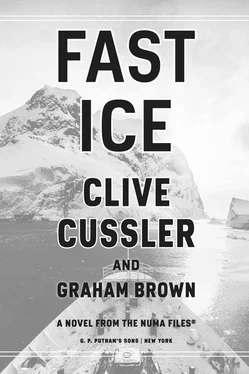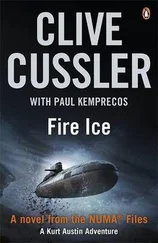“You’ll never get off this ship,” Ryland said.
“When I’m done,” Kurt replied, “we’ll all be looking for a way off this ship.”
—
Back in the pump room, Joe stood beside an intersection of valves and pipes. He had a large box wrench in his hand. This one was specialized, like those used to open fire hydrants. It had a long handle, which allowed the user to get much more leverage, and a closed end with five sides that could fit over the large bolt on the top of the hydrant.
Joe placed it over one of the cross-feed valves and leaned into it. The first shove moved the bolt a fraction of a turn, the second moved it an inch or two and the third effort opened the valve wide. He performed the same task on three other valves and then returned to the control panel.
With the cross-feeds locked in the open position, he activated the pumps at the center of the room. They clanked to life one by one and began to build up pressure. A hiss of air whistled through the pipes, followed by the sound of rushing water. The pipes were large-bore, each one a foot in diameter. They would transfer thousands of gallons a second, once the pressure built to full, but it would still be a long, drawn-out process.
—
From the bridge of the ship, it was easy to feel the Goliath picking up speed. The diesels were running at full power, the twin screws at the aft end of the ship biting firmly and pushing the vessel forward. The fact that it was half filled and riding high made the ship lighter and allowed it to run with less drag from the water. The wind off the glacier was helping as well, pushing on the hull like a sail.
“You’re too late,” Ryland said with pride. “We’re already under way. My men will be suspicious if you try to stop the ship now or order us to turn back. Especially without word from me or the captain. They’ll storm the bridge and you’ll run out of bullets trying to fight them off.”
“I’ll save the last bullet for you,” Kurt promised.
“That won’t help you,” Ryland replied. “My life or death is irrelevant at this point. My people believe in what we’re doing. Killing me will just make me into a martyr. It will fire their spirits to see the job through.”
“And what job is that?” Kurt asked. “Destroying the world? Burying it in ice?”
“I’m simply accelerating what nature will begin in another thirty years or so,” Ryland insisted.
“If that’s true, why not let nature take its course?” Kurt asked. “Let humanity reap what it sows?”
“Because the planet will be weaker and worse off in thirty years,” Ryland insisted. “Humans are destroying the biodiversity of the Earth as fast as they’re destroying the climate and environment. You know it to be true. I’ve read your work on saving the reefs from ocean acidification and the effects of overfishing. I heard you thundering at me in my own home, when you thought I was a man who might burn up the world if there was a profit to be had.”
Kurt stared at Ryland. “What difference does it make if the Earth dies in fire or in ice? It still dies. You’ve offered no solution.”
“The Earth will survive,” Ryland said. “Humanity will as well. But its gross overreaching will be checked. It will emerge again, newer and wiser.”
Kurt turned briefly back to the computer screen and then spoke again, addressing the others. “Is this what he promised you? A part of the new world he’d create for you?”
Neither the bearded man nor the captain responded.
Kurt refocused on Ryland. “Either you haven’t run the simulations correctly or you haven’t shared them with your followers. But there’s a chance your ice age becomes a runaway train. A vicious cycle, colder air creating more ice that cools the air further. In the end, the whole Earth is iced over and locked in a frozen state. What happens to your little sanctuaries at that point? I’ll tell you. The forests, the animals, the people—everything dies. And doesn’t come back.”
“Exaggeration,” Ryland said dismissively. “A fantasy created from false data.”
“Your sister’s data, taken straight from a paper she wrote years ago.”
Ryland went mute for a moment, his jaw clenched and his teeth grinding. “And what would you do about it?” he asked finally. “If the warming isn’t checked, half of the tropics will be unfit for human life within thirty years. Half of the world’s coastlines will be flooded.”
“I’d work for a solution,” Kurt said. “I’d trust in human nature to ultimately be rational. Even if it takes a long time to get there. I’d trust in science to figure out methods to prevent the worst-case scenario. And I’d fight for a compromise that brings people together instead of setting them against one another.”
“You’re a fool,” Ryland said.
“No,” Kurt said. “Just unreasonable enough to ignore the madmen on either side.”
Kurt turned away from the conversation and back to the computer screen. He’d found what he needed—a detailed chart of the bay made by Ryland’s people so they could get the huge ice ship in and out of the area safely. It showed plenty of submerged obstructions, including an underwater ridge three miles away.
The ridge angled sharply outward, jutting into the bay from the shoreline and running at a depth of fifty feet on average. Deep water in front made it particularly dangerous, especially as the Goliath was drawing seventy or eighty feet.
Kurt stepped over to the command terminal, from which the captain would guide the ship. It was a modern system but fairly standard, like those in any large merchant ship.
The engines were already set to full ahead. The ship was doing ten knots and building toward sixteen. Not a speed demon by any means. But once something this size got moving, it would take forever to stop.
Using a control knob, Kurt adjusted the course a few degrees. The helm answered. The rudder swung off center. The huge ship of ice began a slow and shallow turn.
Even then, Kurt felt it lean. The vessel was top-heavy and unstable.
With the straightening up on its new course, Kurt kept his eyes moving. A quick glance at the screen was followed by a quick glance at the prisoners and then the hatch to make sure the handles were still locked down tight.
Operating this way, Kurt saw the whole room. What he didn’t see was the captain keying the mic of a handheld radio behind his back. The man was clicking the transmit button on and off, sending a call for help to anyone who might be listening.
Two miles from the ridge, Kurt made a second small adjustment to the ship’s course and then a third, more significant change. This put the Goliath on a line to intercept the submerged ledge.
He peered through the bridge windows, searching for any sign of the shoreline, but could barely see past the bow of the ship. A camera system gave a better view. Black water beneath a gray sky, low-lying cliffs just visible in the distance.
The speed reached thirteen knots and was rising. An alarm began flashing on the navigation screen. Blinking yellow accompanied by chirping.
It was a first-level hazard warning. The system had determined that Kurt’s course would take them over the rocks.
The captain stirred first, sitting up taller. “What are you doing?”
“What is that?” Ryland asked.
“Hazard warning,” the captain said. “He’s running us aground.”
Ryland shifted his position, getting ready to attack. Kurt turned toward him, prepared to fire if any of them got up off the floor.
As he looked their way, the latch handle on the hatchway swung up and the door flew open. A pair of Ryland’s men burst in with guns in their hands.
Kurt opened fire, cutting one of them down and forcing the other one back into the passageway.
Читать дальше












